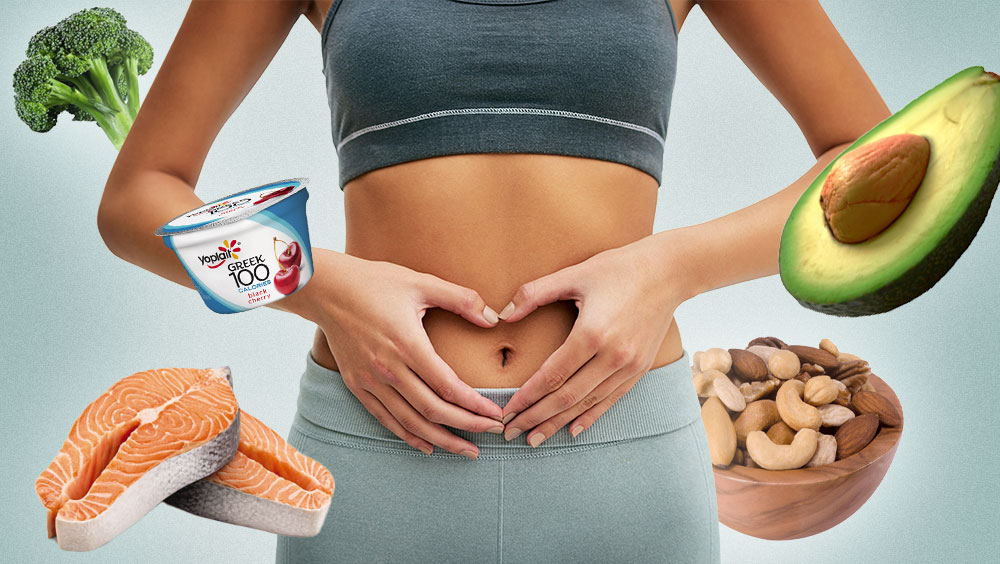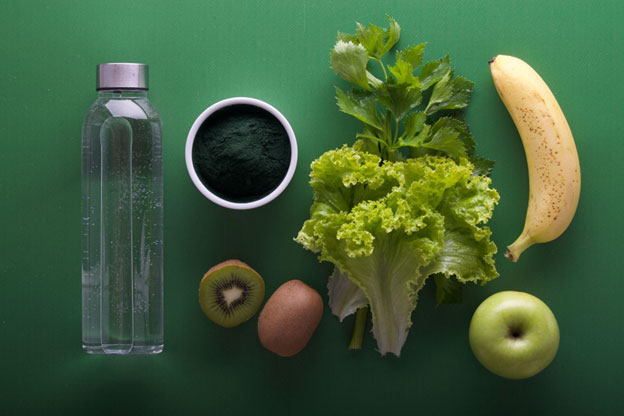
Every day, we make decisions that impact our digestion. What we eat has a direct effect on the health of our gut and our overall well-being. From fermented foods to high-fiber options, there are certain foods that can help promote a healthy gut. In this article, we'll explore the best foods for gut health and discuss other factors to consider. So grab a snack and let's get started – it's time to learn how eating right can keep your gut feeling great!

What Nutrients Does A Healthy Diet Consist Of?
A healthy diet plays a key role in promoting gut health. So what nutrients should you be including?
Firstly, aim to include plenty of prebiotic foods such as garlic, onions, and leeks. Secondly, include probiotic foods such as yogurt, sauerkraut, and kimchi. Probiotics are live microorganisms that can help restore balance to your digestive system. Finally, look for foods high in omega-3 fatty acids such as salmon and walnuts. Omega-3 fatty acids have anti-inflammatory properties, which can be beneficial for digestive disorders like irritable bowel syndrome and inflammatory bowel disease.
What Foods Should I Avoid?
In addition to eating healthy foods to promote gut health, it’s also important to avoid certain items. Refined carbohydrates such as white bread and pasta can cause blood sugar levels to spike, leading to inflammation and imbalances in your digestive system. Artificial sweeteners, preservatives, and trans fats should also be avoided. Additionally, keep an eye on your intake of caffeine and alcohol, as these can both have a negative effect on gut health.
Top Foods to Promote a Healthy Gut
To promote a healthy gut, it's important to focus on foods that contain beneficial bacteria, prebiotics, probiotics, and plenty of fiber.
Fermented foods such as yogurt, kefir, sauerkraut, and kombucha are rich in beneficial bacteria that help keep the balance of your gut flora in check. High-fiber options like oats, barley, beans, and legumes are great for digestive health as they help keep your digestive tract running smoothly. Prebiotic fibers such as artichoke hearts and onions feed healthy gut bacteria so they can thrive.
Omega-3 fatty acids found in fatty fish like salmon also play an important role in maintaining a healthy gastrointestinal tract. Eating foods with anti-inflammatory properties like leafy greens, nuts, and seeds can help reduce the risk of chronic diseases such as irritable bowel syndrome and inflammatory bowel disease. Finally, consuming soluble fibers from fruits and vegetables can help reduce blood sugar levels while providing a steady source of energy throughout the day.
Fermented foods
Fermented foods are a great way to promote gut health and overall well-being. These foods are loaded with beneficial bacteria, which help keep the balance of your gut flora in check and improve digestion. Examples of fermented foods include yogurt, kefir, sauerkraut, kimchi, and kombucha. Eating these foods regularly can help reduce the risk of chronic diseases such as IBS and IBD while providing numerous other health benefits.

And don't forget about prebiotic fibers! Foods like artichoke hearts and onions contain prebiotic fibers that feed healthy bacteria in your gut so they can thrive. Omega-3 fatty acids found in fatty fish like salmon also play an important role in maintaining a healthy gastrointestinal tract.
High-fiber foods
High-fiber foods are an essential part of any healthy diet, and they’re especially important for gut health. Fiber is a type of carbohydrate that our bodies can’t digest, so it passes through the digestive tract without being broken down. This helps keep things moving along and prevents constipation, which can be uncomfortable and even lead to more serious complications.
Fruits, vegetables, legumes, and whole grains are all excellent sources of fiber. Eating a variety of these foods is key to getting enough fiber in your diet each day. Some great high-fiber picks include raspberries (8 grams per cup!), black beans (15 grams per cup!), and quinoa (5 grams per cup!).
Not only does fiber help with digestion and regularity, but it may also reduce the risk of certain chronic diseases like heart disease, stroke, and type 2 diabetes. It also helps to regulate blood sugar levels by slowing down the absorption rate of glucose into the bloodstream.
Prebiotic foods
Prebiotic foods are an important part of a healthy diet, especially when it comes to gut health. Prebiotics are indigestible fibers that act as food for the good bacteria living in our digestive tract. By consuming prebiotics on a regular basis, we can help maintain the balance of beneficial and harmful bacteria in our gut, which is essential for optimal digestion and overall health.
Some of the best sources of prebiotic fiber are onions, garlic, asparagus, bananas, and oats. Other great sources include legumes (such as chickpeas and lentils), apples, and Jerusalem artichokes. In addition to helping keep your gut balanced and healthy, these foods may also reduce inflammation throughout the body and improve mental health by reducing stress levels.
To get the most out of your prebiotic-rich foods, pair them with probiotic-rich foods like yogurt or sauerkraut for an extra boost of beneficial bacteria. And don’t forget to stay hydrated—drinking plenty of water will help your body absorb more nutrients from these fiber-filled foods!
Gut-Healing Nutrients and Compounds in Food
Gut health is something that many people don't think about, but it's essential for a healthy body and mind. Fortunately, there are several nutrients and compounds found in food that can help to heal your gut and improve your overall well-being.
Omega-3 fatty acids are one of the most beneficial nutrients when it comes to gut healing. Found in fish, nuts, and oils like flaxseed and olive oil, omega-3s can help reduce inflammation in the digestive tract while supporting healthy bacteria growth.
Soluble fiber is another important nutrient for gut health. It helps to regulate digestion by slowing down the transit time of food through the intestines which allows more time for absorption of nutrients. Some excellent sources of soluble fiber include oatmeal, applesauce, blueberries, oranges, and carrots.
Finally, probiotics are a type of beneficial bacteria found in fermented foods like yogurt, sauerkraut, kefir, and kimchi that can help restore balance to the gut microbiome. Eating these probiotic-rich foods on a regular basis can support digestive health while reducing symptoms associated with irritable bowel syndrome (IBS) and inflammatory bowel disease (IBD).

Other Factors to Consider for Gut Health
In addition to the food we consume, there are a few other factors that can influence our gut health. Stress is one of the most common and can lead to an imbalance in our digestive system. Try to practice stress-management techniques like deep breathing or yoga to help keep your gut balanced.
Exercise is also important for maintaining healthy bacteria levels, as it helps to increase circulation and move waste products out of our bodies more quickly. Even just a few minutes of exercise each day can make a difference.
Finally, getting enough sleep is essential for keeping your gut healthy as well. During sleep, the body works hard to regulate hormones and repair the lining of your intestinal tract, so aim for 7-8 hours per night when possible.
Benefits Of A Healthy Gut
The good bacteria in our gut help to improve digestion, support the immune system, reduce inflammation, and even protect against chronic diseases like heart disease and diabetes. Eating prebiotic-rich foods and probiotic-rich fermented foods can help maintain the balance of beneficial and harmful bacteria in your digestive tract, allowing you to reap all the benefits of a healthy gut.
What Causes Gut-Related Diseases
Gut-related diseases are on the rise, and there are several factors that can contribute to their development. Diet is one of the biggest culprits when it comes to gut health—eating a lot of processed foods, sugar, and unhealthy fats can all lead to an imbalance in your gut bacteria. Other factors like smoking and excessive alcohol consumption also play a role in disrupting the balance of good and bad bacteria in the digestive tract.
Who Is At Risk?
As with any health issue, certain groups of people are more at risk for developing gut-related diseases. Those with a family history of gastrointestinal conditions, such as Crohn's disease or irritable bowel syndrome (IBS), may be more likely to experience digestive issues. People who are overweight and those who consume high amounts of processed foods and sugar are also at an increased risk. Additionally, those with weakened immune systems, such as the elderly or people living with HIV/ AIDS, are more vulnerable to developing gut-related diseases.
A Roundup of Gut-Friendly Foods
Eating a balanced diet is essential for promoting gut health, and there are plenty of delicious and nutritious foods that can help support your digestive system. Here's a roundup of some of the best gut-friendly foods:
- Prebiotic Foods: Artichokes, Asparagus, Garlic, Onions, Whole Grains
- Probiotic Foods: Yogurt, Kefir, Sauerkraut, Kimchi
- Healthy Fats: Avocados, Nuts & Seeds (especially Flaxseeds), Olive Oil
- High-Fiber Foods: Apples, Pears, Sweet Potatoes, Oats
- Anti-Inflammatory Foods: Turmeric, Ginger, Berries, Leafy Greens
Conclusion
Good gut health is essential for our overall well-being. Eating a balanced diet full of prebiotic and probiotic foods, exercising regularly, and getting enough sleep are all key components to improving the balance of bacteria in our digestive system. Not only will this help to keep our digestive tract functioning properly, but it may also reduce the risk of chronic diseases like heart disease and inflammatory bowel disease. Eating an anti-inflammatory diet rich in plant foods, omega-3 fatty acids, soluble fiber, and healthy gut bacteria can also be beneficial for mental health. By making small changes to your lifestyle and diet you can dramatically improve your gut health and overall health!

Frequently Asked Questions:
What is gut health?
Gut health is the condition of our digestive system, including both the physical and chemical processes that take place in our gastrointestinal tract. It’s important for overall health because it helps us to absorb nutrients from food and expel waste products. Poor gut health can lead to digestive problems like bloating, diarrhea, constipation, and indigestion, as well as other chronic conditions like heart disease, diabetes, and inflammatory bowel disease.
What are the benefits of having a healthy gut?
Having a healthy gut can have many positive benefits on your overall health and well-being. A balanced microbiome can help boost your immune system, improve nutrient absorption, reduce inflammation, and support mental health. Eating prebiotic and probiotic foods can help to keep the bacteria in your digestive tract balanced which can lead to better digestion, reduced bloating, and decreased risk of certain types of chronic diseases.
What are some signs of poor gut health?
Signs of poor gut health can include abdominal cramps and pain, diarrhea, constipation, bloating, gas, indigestion, and fatigue. Poor gut health can also lead to nutrient deficiencies and an increased risk of certain chronic conditions like heart disease and inflammatory bowel disease. Additionally, it can affect your mental health as well with symptoms like depression or anxiety. If you are experiencing any of these symptoms, it is important to contact your healthcare provider.
How can I improve my gut health?
Improving your gut health can be achieved with a few simple lifestyle changes. Eating a balanced diet full of prebiotic and probiotic foods, like yogurt, sauerkraut, miso, and kimchi, can help to balance your microbiome and improve digestion. Additionally, incorporating more fiber into your diet from sources such as whole grains, legumes, vegetables, and fruits can help to keep your digestive system running smoothly. Exercise and getting enough sleep are also important for overall gut health, as they can improve circulation and reduce inflammation. Finally, reducing stress levels can have a positive effect on your gut health as well.
Can probiotics and supplements help with gut health?
Probiotics and supplements may be beneficial for gut health in some cases. Probiotics are live bacteria that can help to maintain the balance of good bacteria in your gut, which can improve digestion and reduce inflammation. Supplements containing omega-3 fatty acids, fiber, and certain vitamins and minerals can also be beneficial as these nutrients are essential for the proper functioning of the digestive system. However, it’s important to talk to your healthcare provider before starting any supplement regimen.